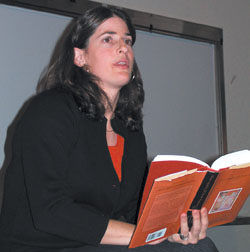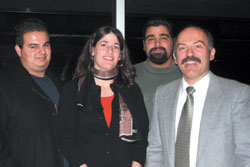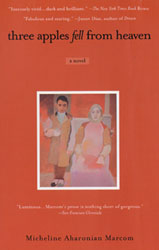Christopher Tozlian
Staff Writer
Three years after beginning what eventually would take countless hours of hard work, Micheline Aharonian Marcom is finished. In 1997, Marcom began writing her debut novel, Three Apples

Micheline Aharonian Marcom
Fell From Heaven, which she completed just last year. But don’t let the title fool you…this is not just another book written by an Armenian on Armenian folklore, as the title might suggest. No, this is a masterpiece of historical fiction based on the Armenian genocide. The reason for its title, Marcom explained during her lecture, co-sponsored by the Armenian Students Organization and Armenian Studies Program, is that there are many myths surrounding the genocide, and the Turkish government still considers it to be simple Armenian myth, as they continue to deny what the rest of the world realizes to be the first genocide of the twentieth century. It is for this reason that the book is so titled, Three Apples Fell From Heaven, so that this piece of historical fiction may combat the “myth” of the Armenian genocide.
This work, which has received rave reviews by various scholars and literary critics, was introduced to the students of CSU Fresno and the people of the Fresno community on Tuesday, November 27th, as Marcom gave a reading from her work, which was followed by a “question and answer” session. As Marcom read excerpts from her book those in the auditorium listened, and reminisced of the stories told to them by their parents and grandparents who endured the genocide. So powerful was her choice of words and so clear was her message that some in the auditorium were moved to tears, while the rest of us simply sat in silence on the edge of our seats. Marcom’s powerful work, Three Apples Fell From Heaven, tugs at the heart and causes all to remember the plight of the Armenians who faced the genocide.

Marcom’s original goal was to write a historical novel based on the life of her grandmother, who survived the genocide. However, as Marcom continued to educate herself on the genocide, she read manuscripts, memoirs, and biographies of those who faced the killings and abuse of the Ottoman Turks, and who had lived to tell about it; she began to realize that so many different groups of people weren’t represented in Armenian genocide accounts. As a result, she began to write fictional accounts of what others faced, basing these accounts on the cruel facts she had taken from her research. Three years later, she ended up with a literary work much different than what she had originally planned. It was no longer a novel based on the suffering that her grandmother had encountered, but a novel of the sufferings of countless Armenians, both men and women, young and old.
Marcom’s stories come alive as the reader finds characters faced with the grim reality that they must give their babies up to exposure, since they could not survive on the death marches. Other accounts tell of the multiple times Turkish soldiers searched women, stealing all possessions worth any monetary value, and then raping them. There are stories of a boy who hid in his mother’s attic to escape the wrath of the Turkish soldiers; another story tells of the Armenian girl, Anaguil, who was cared for by Turkish neighbors after her parents were killed… this young girl was Marcom’s grandmother. Marcom’s novel deals with a wide variety of people from different places in society; yet they all share a common bond: in one way or another, the Armenian genocide has forever changed their lives.
 During the “question and answer” time, a number of observations were made regarding how genocide survivors have responded to the genocide. Marcom explained that many deal with the genocide by constantly speaking of it, as a means of finding healing; others simply say nothing, apparently too ashamed to discuss the grim reality that more than one million Armenians were murdered during the systematic killings that took place, beginning in 1915. The discussion is somewhat reminiscent to the one that takes place in Michael Arlen’s famous novel, Passage to Ararat, as he describes for readers in great detail the themes of shame and frustration that many Armenians have faced, and still continue to face.
During the “question and answer” time, a number of observations were made regarding how genocide survivors have responded to the genocide. Marcom explained that many deal with the genocide by constantly speaking of it, as a means of finding healing; others simply say nothing, apparently too ashamed to discuss the grim reality that more than one million Armenians were murdered during the systematic killings that took place, beginning in 1915. The discussion is somewhat reminiscent to the one that takes place in Michael Arlen’s famous novel, Passage to Ararat, as he describes for readers in great detail the themes of shame and frustration that many Armenians have faced, and still continue to face.
Yet Marcom’s lecture came to a warm end, as she discussed the necessity of her work, and that of related works. Marcom explained that we cannot forget what has happened, because it is part of who we are as Armenians. Three Apples Fell from Heaven is a great work which neither points blame nor makes a plea for pity. It simply tries to tell the stories of those whose stories one would never have known, except for the reading of this work. Just as the author’s reading was stimulating and well worth the while, Marcom’s novel, is well worth the literary praise that it has received, and will continue to receive.
The lecture was funded, in part, by the Associated Students at Fresno State.
 Hye Sharzhoom Armenian Action
Hye Sharzhoom Armenian Action